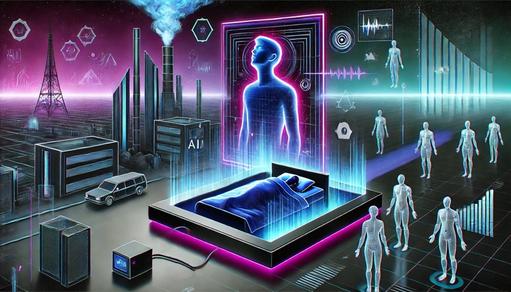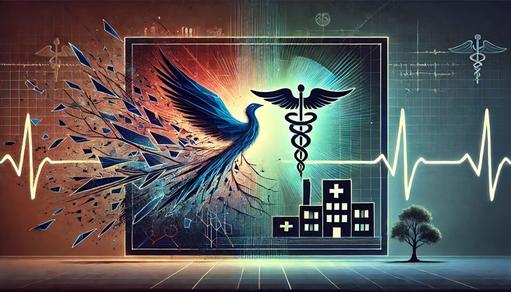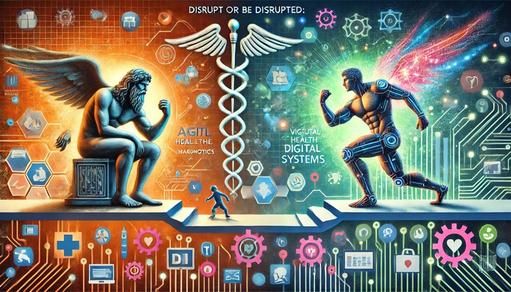|
From Devices to Platforms
The MedTech industry is moving beyond traditional hardware-driven business models toward integrated, service-based ecosystems. Historically, companies focused on selling standalone medical devices, but the future belongs to platforms that leverage software, connectivity, and real-time data to drive continuous value. This shift reflects a broader trend in healthcare: the move from episodic, reactive treatment to proactive, continuous management of patient health and wellbeing.
A key driver of this transformation is the integration of MedTech with telehealth and virtual care. The COVID-19 pandemic accelerated the adoption of remote healthcare, forcing regulatory bodies, payers, and providers to embrace digital-first models. Connected medical devices - ranging from remote monitoring tools to AI-powered diagnostic platforms - now enable clinicians to deliver high-quality care beyond hospital walls, reducing the burden on overstretched healthcare systems.
However, this evolution is not without challenges. Cloud computing and interoperability remain hurdles, as fragmented data systems hinder communications between devices, electronic health records (EHRs), and healthcare providers. Standardising data exchange and ensuring cybersecurity is critical to unlocking the potential of digital health.
At the forefront of this change is the rise of digital therapeutics and Software as a Medical Device (SaMD). These AI-driven applications, approved by regulators, are redefining treatment paradigms by offering evidence-based interventions for conditions ranging from diabetes to mental health disorders. The companies that successfully transition from product manufacturers to digital health platform leaders will help define the future of MedTech.
Regulatory & Compliance Landscape: Adapting to Change
The MedTech industry operates in one of the most regulated environments, and as innovation accelerates, regulatory frameworks worldwide struggle to keep pace. Companies must navigate a complex and evolving landscape, balancing speed to market with stringent compliance requirements. In the US, the Food and Drug Administration (FDA) has introduced more flexible pathways for digital health solutions, AI-driven diagnostics, and SaMD, but scrutiny over safety, efficacy, and real-world performance remains high. Meanwhile, the European Union Medical Device Regulation (EU MDR) has raised the bar for clinical evidence, risk assessment, and post-market surveillance, posing compliance challenges for manufacturers. In China, an expanding regulatory framework seeks to align with international standards while maintaining strict control over data security and intellectual property.
One of the most transformative regulatory shifts is the growing emphasis on real-world evidence. Regulators are increasingly requiring post-market surveillance data to assess device performance beyond clinical trials. This shift compels companies to integrate real-time monitoring, AI-powered analytics, and patient-reported outcomes into their regulatory strategies.
At the same time, the rise of connected healthcare systems has introduced new risks, particularly in cybersecurity and data privacy. With medical devices and digital health platforms generating vast amounts of sensitive patient data, companies must ensure compliance with data protection regulations such as the US Health Insurance Portability and Accountability Act of 1996 (HIPAA), the EU’s General Data Protection Regulation (GDPR), and China’s Personal Information Protection Law (PIPL). Further, cyber threats pose not only financial and reputational risks but also patient safety concerns, making robust cybersecurity measures an imperative rather than an afterthought.
For MedTech leaders, regulatory agility is no longer optional - it is a competitive advantage. Companies that proactively engage with regulators, leverage real-world data, and prioritise cybersecurity will navigate compliance complexities more effectively, positioning themselves as trusted innovators in a rapidly evolving market.
AI, Ethics, and the Future of Decision-Making in MedTech
As AI becomes increasingly embedded in MedTech, a critical challenge emerges how to balance automation with human oversight in medical decision-making. AI-driven diagnostics, robotic-assisted surgeries, and predictive analytics promise greater efficiency, accuracy, and personalisation of care. However, the inherent limitations of AI - such as the risk of false positives or negatives, lack of contextual understanding, and vulnerability to biases - highlight the necessity of keeping (human) clinicians in the loop. The future of MedTech will not be about replacing doctors but augmenting their expertise with AI-driven insights.
One of the most pressing ethical concerns is algorithmic bias. AI models are only as good as the data they are trained on, and historical healthcare datasets often reflect systemic disparities in access and treatment. If left unchecked, biased algorithms could exacerbate healthcare inequalities by delivering inaccurate diagnoses or suboptimal treatment recommendations for underrepresented populations. MedTech companies must invest in diverse, representative datasets and establish mechanisms for continuous bias auditing to ensure AI supports equitable healthcare for all.
Another ethical challenge is patient data privacy. AI-powered diagnostics and predictive tools require vast amounts of sensitive health data, raising concerns about consent, ownership, and security. As AI systems become more autonomous, MedTech companies must prioritise transparency in data usage, ensure compliance with global privacy regulations (HIPAA, GDPR, PIPL), and build trust with patients and healthcare providers alike.
The future of AI in MedTech hinges not only on technological advancements but also on ethical stewardship. Companies that proactively address these challenges - by implementing robust governance frameworks, fostering transparency, and embedding fairness into their AI models - will lead the industry into a future where innovation and ethical responsibility go hand in hand.
Market Dynamics: The Competitive Landscape and Investment Trends
The MedTech industry is experiencing a wave of consolidation, partnerships, and new market entrants as companies race to secure competitive advantages in a rapidly evolving landscape. Mergers and acquisitions (M&A) are reshaping the industry, with traditional MedTech giants acquiring AI-driven start-ups and digital health companies to expand their capabilities beyond hardware into data-driven solutions. At the same time, strategic partnerships with pharmaceutical firms, hospitals, and giant tech companies - such as Google, Amazon, and Apple - are redefining healthcare delivery. Big tech’s entry into MedTech is disruptive, as these firms leverage their vast data ecosystems, AI expertise, and consumer reach to challenge incumbents.
Meanwhile, venture capital (VC) funding is fuelling a new wave of innovation, with start-ups developing AI-powered diagnostics, robotic surgical systems, and digital therapeutics. The influx of investment has democratised innovation, allowing agile, data-driven companies to compete with legacy MedTech firms. However, the shift from product-based to platform-based business models presents scalability challenges, as start-ups must navigate complex regulatory environments while proving clinical efficacy and economic value.
Beyond established markets, emerging economies offer significant growth opportunities. Rapidly expanding healthcare infrastructure, increasing demand for affordable medical technology, and government-driven digital health initiatives make regions such as Asia, Latin America, and Africa attractive for investment. However, navigating regulatory complexities, supply chain constraints, and pricing pressures will require localised strategies and innovative business models.
To thrive in this increasingly dynamic environment, MedTech leaders must think strategically, embrace collaboration, remain agile in their investment strategies, and leverage both organic growth and acquisitions to stay ahead of the competition. The companies that successfully integrate AI, digital health, and global expansion strategies will define the next era of MedTech leadership.
The Patient-Centric Future: Reimagining Healthcare Delivery
The future of healthcare is shifting away from traditional hospital-centred models toward a decentralised, patient-driven approach. MedTech companies are at the forefront of this transformation, leveraging digital tools, remote monitoring, and AI-powered analytics to bring care closer to the patient. Advances in telehealth, wearable technology, and home-based diagnostics are enabling continuous, real-time health monitoring, reducing the need for in-person visits, and improving long-term outcomes for patients with chronic conditions. This shift not only alleviates pressure on overstretched healthcare systems but also enhances accessibility for patients in rural or underserved regions.
Consumer-driven healthcare is another defining trend, as patients demand greater control over their health data and treatment decisions. Digital health apps, AI-driven symptom checkers, and wearable sensors are empowering individuals to proactively manage their wellbeing, moving healthcare from a reactive to a preventive model. With personalised insights and real-time feedback, patients are no longer passive recipients of care but active participants in their health journeys.
Predictive analytics play a crucial role in this transformation. AI-driven models can identify early disease markers, assess risk factors, and provide personalised preventive recommendations. By leveraging vast datasets from wearable devices, genetic testing, and electronic health records, predictive medicine can help prevent hospitalisations, reduce healthcare costs, and ultimately improve population health.
For MedTech companies, the challenge - and opportunity - lies in building integrated, patient-centric solutions that are both technologically advanced and user-friendly. However, despite these changes in technology, market dynamics, and patient expectations, many traditional boards may not yet be fully engaging with the strategic implications of this transformation. As healthcare moves from standalone devices to interconnected digital ecosystems, the need for forward-looking governance becomes ever more critical. Ensuring that these paradigm shifts are not just acknowledged but actively incorporated into long-term strategies will be essential for MedTech companies to remain competitive and patient-focused.
Staying Ahead in MedTech: A Strategic Roadmap for Resilience and Innovation
In an era where AI, digital health, and data-driven medicine are redefining MedTech, staying competitive requires more than just keeping pace - it demands a recalibration of strategy. For companies facing resource constraints, operational pressures, or even firefighting immediate challenges, the path forward may seem daunting. However, securing long-term relevance does not have to come at the expense of addressing pressing issues.
MedTech leaders can drive impact by implementing targeted, high-value digital transformations that deliver both quick wins and strategic advantages. AI-powered diagnostics, predictive analytics, and automation are no longer distant innovations but immediate enablers of efficiency, cost reduction, and improved patient outcomes. Even incremental adoption - such as deploying AI in operational workflows, leveraging cloud-based data management, or automating compliance processes - can yield measurable benefits without overextending resources.
Equally critical is regulatory agility. With evolving global frameworks such as the FDA’s AI-driven SaMD guidance and the EU MDR, companies cannot afford regulatory lag. Embedding regulatory intelligence into R&D and product development - through modular, software-driven solutions that evolve with real-world data - ensures market readiness without unnecessary delays.
For businesses struggling to plan beyond the immediate horizon, futureproofing does not require an all-or-nothing approach. Instead, a phased strategy - where short-term efficiencies build the foundation for long-term competitiveness - allows underperforming companies to regain momentum without excessive risk. As emerging trends like personalised medicine, blockchain-enabled health data management, and quantum computing evolve, MedTech leaders must cultivate a pragmatic yet forward-looking mindset, leveraging cross-industry collaborations and strategic partnerships to remain relevant.
Resilience and innovation are not mutually exclusive. To thrive in an increasingly complex landscape, MedTech companies must balance immediate operational fixes with scalable, technology-driven advancements. However, industry leadership requires more than agility - it demands foresight. By strategically planning for the next four to five years, organisations can proactively shape their trajectory, ensuring sustainable growth and a competitive edge. The following high-level roadmap outlines a structured approach for a constrained traditional MedTech to navigate this evolution with clarity and purpose.
A 4-5 Year Roadmap for MedTech Evolution
Phase 1: Digital Foundations & Compliance (Year 1-2)
- Regulatory Readiness: Implement AI-driven compliance monitoring and real-time risk management.
- Manufacturing Digitalisation: Deploy Internet of Things-enabled smart manufacturing and cloud-based quality control for end-to-end traceability.
- Operational Efficiency: Automate processes, optimise costs, and leverage blockchain for supply chain integrity.
Phase 2: Transition to Digital & AI-Driven Services (Year 2-3)
- Portfolio Optimisation: Phase out underperforming hardware and shift R&D toward smart devices and digital therapeutics.
- AI-Enabled Devices: Modernise legacy products with modular software, embedding real-time monitoring and remote diagnostics.
- Cultural Shift: Upskill leadership, adopt agile product development, and transition from proprietary models to open-platform collaborations.
Phase 3: AI-Powered Growth & Platform Monetisation (Year 3-5)
- AI & Predictive Innovation: Develop digital biomarkers, smart surgical systems, and AI-driven disease progression models.
- Platform Expansion: Establish a mobility as a service (MaaS) model, integrating AI, software, and predictive analytics.
- Investor & Market Positioning: Shift perception from manufacturing to digital health leadership, leveraging strategic acquisitions and partnerships.
Key Milestones
- Year 1: Regulatory compliance secured - AI-driven automation initiated.
- Year 2: Cost optimisation achieved - first smart-enabled devices launched.
- Year 3: AI-driven R&D operational - digital platform architecture in place.
- Year 4-5: Full platform monetisation - AI-driven revenue streams, established leadership in MedTech digital transformation.
Takeaways
The MedTech industry stands at a defining inflection point. The convergence of AI, digital health, and personalised medicine is not a distant vision - it is unfolding now. Companies that fail to adapt will not just fall behind; they will likely perish. Traditional, hardware-focused business models are giving way to data-driven, service-oriented ecosystems. Regulatory landscapes are evolving, competition is intensifying, and patient expectations are higher than ever. The question is no longer whether to embrace change, but how strategically and sustainably leaders can pivot.
Winning in this new era will require more than bold rhetoric or short-term adjustments - it demands a carefully planned and executed strategic pivot spanning four to five years. MedTech leaders must resist the urge for reactive, incremental fixes and instead commit to a disciplined transformation. This means embedding long-term thinking into every aspect of operations, investing in digital capabilities, AI integration, and patient-centric solutions, and ensuring that regulatory hurdles and interoperability challenges are leveraged as competitive advantages rather than barriers.
No company can navigate this transformation in isolation. Collaboration is no longer optional - it is a strategic necessity. Leaders must forge alliances with regulators, healthcare providers, research institutions, start-ups, and technology firms to co-create the future of healthcare.
The time for short-termism is over. The MedTech companies that embrace disruption, commit to a structured, multi-year transformation, and redefine their role in the healthcare ecosystem will lead the next era of patient care. Those who hesitate will be left watching from the side-lines as the industry reshapes itself without them. The choice is clear.
|


 2 comments
2 comments














